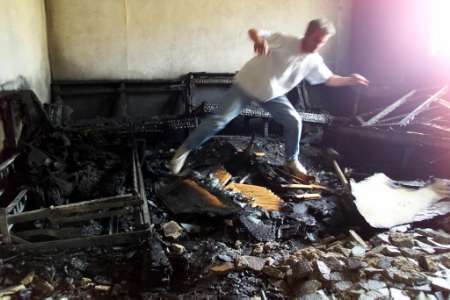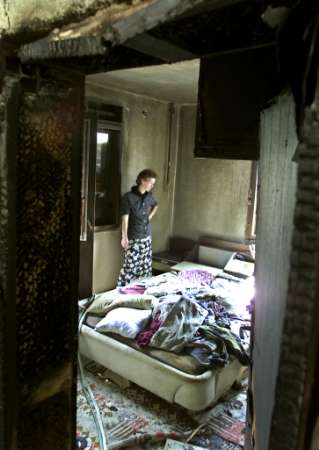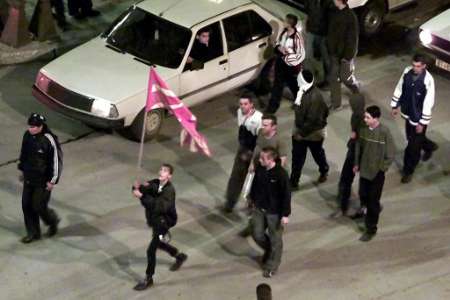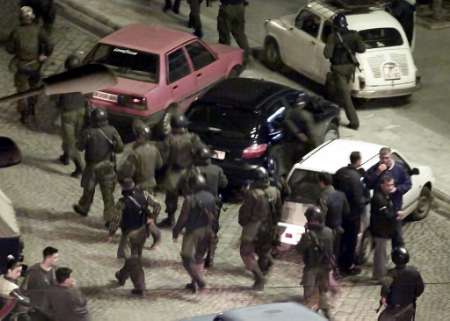Enter content here Relatives of the slain ethnic Albanian soldier from the Macedonian army corps mourn his death at a funeral in the village of Odri, June 7, 2001. The soldier was one of the five killed two days ago in an ambush by ethnic Albanian rebels on the hills of the Sar mountain. REUTERS/Ognen Teofilovski The mother of a slain Macedonian soldier cries over his coffin during an Orthodox funeral ceremony in the southern town of Bitola, June 7, 2001. The soldier was one of five killed two days ago in Tetova and Macedonian Slavs smashed dozens of houses and shops in Bitola belonging to ethnic Albanians in response. REUTERS/Radu Sigheti The brother of a killed Macedonian soldier cries over his coffin June 7, 2001 during Orthodox funeral ceremony in southern town of Bitola. The soldier was one of five killed two days ago in Tetova and Macedonian Slavs smashed dozens of houses and shops in Bitola belonging to ethnic Albanians in response. REUTERS/Radu Sigheti A Macedonian soldier fixes the cross of a comrade as relatives mourn over the coffin in the southern town of Bitola, June 7, 2001. The soldier from Bitola was one of five killed two days ago in Tetova, Macedonian Slavs smashed dozens of houses and shops belonging to ethnic Albanians in Bitola in response. REUTERS/Radu Sigheti Local gypsies loot an ethnic Albanian burned house in Bitola June 7, 2001 marked on the wall with a grafitti reading: Death to Albanians". Burnt-out shops and homes smouldered after a night of rioting by Macedonian Slavs in retaliation for the killing of soldiers by ethnic Albanian guerrillas. Crowds rampaged through Bitola, Macedonia's second city on the evening, attacking ethnic Albanian businesses and homes. Government officials said around 50 premises had been damaged and 13 people had been hurt, three with bullets from weapons fired by business owners defending their properties. REUTERS/Radu Sigheti  An ethnic Albanian jumps over the burning wooden floor of his house in Bitola June 7, 2001. Burnt-out shops and homes smouldered after a night of rioting by Macedonian Slavs in retaliation for the killing of soldiers by ethnic Albanian guerrillas. Crowds rampaged through Bitola, Macedonia's second city in the evening, attacking ethnic Albanian businesses and homes. Government officials said around 50 premises had been damaged and 13 people had been hurt, three with bullets from weapons fired by business owners defending their properties. REUTERS/Radu Sigheti  An ethnic Albanian woman looks at a destroyed room of her burnt out house in Bitola June 7, 2001. Burnt-out shops and homes smouldered after a night of rioting by Macedonian Slavs in retaliation for the killing of soldiers by ethnic Albanian guerrillas. Crowds rampaged through Bitola, Macedonia's second city on the evening, attacking ethnic Albanian businesses and homes. Government officials said around 50 premises had been damaged and 13 people had been hurt, three with bullets from weapons fired by business owners defending their properties. REUTERS/Radu Sigheti  A man waves the Macedonian flag while another behind him brandishes a knife as hundreds of anti-Albanian protesters march through the southern city of Bitola June 7, 2001, in defiance of an overnight curfew. Two days ago, Macedonian Slavs smashed dozens of houses and shops belonging to ethnic Albanians in Bitola, outraged by the rebel slaying of five soldiers. Ethnic Albanian guerrillas on Thursday volunteered to stop fighting, improving peace prospects on the eve of the expected announcement by Macedonia's president of a plan to encourage the rebels to disband. REUTERS/Radu Sigheti -- MACEDONIA OUT --  Macedonian policemen deploy around hundreds of anti-Albanian protesters marching through the southern city of Bitola, June 7, 2001 in defiance of an overnight curfew. Two days ago, Macedonian Slavs smashed dozens of houses and shops belonging to ethnic Albanians in Bitola, outraged by the rebel slaying of five soldiers. Ethnic Albanian guerrillas on Thursday volunteered to stop fighting, improving peace prospects on the eve of the expected announcement by Macedonia's President of a plan to encourage the rebels to disband. REUTERS/Radu Sigheti -- MACEDONIA OUT Macedonia: Albanian Rebel Abuses of Serb Civilians. Human Rights News (New York, June 7, 2001) The National Liberation Army (NLA) physically abused eight ethnic Serb civilians whom it arbitrarily detained in the Macedonian village of Matejce last week, Human Rights Watch charged today. Altogether, at least 21 ethnic Serb men, many of them elderly, were detained by the Albanian rebel group.
"These villagers were clearly not combatants," said Holly Cartner, executive director of the Europe and Central Asia division of Human Rights Watch. "The NLA has a responsibility to respect international law, just as much as the Macedonian government does."
According to interviews conducted in Macedonia this week by Human Rights Watch, the NLA arbitrarily detained two different groups of Serbian civilians in the mosque of Matejce, a village with a mixed Serbian and Albanian population west of Kumanovo. The village has been the location of ongoing fighting between the NLA and Macedonian forces for much of the past week.
Both Albanian and Serbian witnesses said that all of the villagers of Matejce had decided to try to avoid the fighting between the NLA and Macedonian forces, and ethnic Albanian elders of the village had requested that the NLA stay out of the village. However, following heavy fighting in the nearby villages of Vaksince and Slupcane, NLA fighters entered Matejce around May 24 and attacked the government police station, pulling the village of Matejce into the conflict.
Sixty-year-old Krunislav Filipovic, an ethnic Serb, was taken from his home by NLA fighters on the evening of May 24. He was taken to the village mosque together with three other elderly ethnic Serbs, he told Human Rights Watch. All four were fathers of Macedonian policemen, apparently the reason for their detention. At the village mosque, NLA fighters beat the four men with their fists and gun butts and kicked them. On several occasions, the men were subjected to mock executions, and NLA fighters sharpened knives in front of the men, threatening to behead them. The men were kept in detention, abused for four days, and then released in the village of Otla, where they were told to walk towards Macedonian government positions. NLA soldiers fired above their heads as they fled.
Two of Filipovic's fellow captives remain hospitalized in Kumanovo as of June 8. Police guards at the hospital refused to allow Human Rights Watch researchers access to the men, thereby preventing the researchers from documenting their injuries and providing a more complete description of the incident. Human Rights Watch's investigation was further impeded by the refusal of the Macedonian police to allow access to the Serbian-inhabited village of Umni Dol.
Seventy-eight-year-old Bozidar Trojanovic was also detained at the village mosque by NLA fighters on May 25, together with three other men and three women, most of them elderly. The four men in the group were beaten at the mosque, according to Trojanovic, although the women were not physically abused: They started kicking our [the men's] legs with their boots. We kept silent; there was nothing we could do. Then they ordered us to stand up and face the wall, and to bend our heads. They kept hitting us on the back of the head. Then they told us to turn around and to turn our faces to one side. They slapped my [male relative] four times on each side. Then they told him to hit his brother just like that. The second group of ethnic Serbs was detained in a guarded basement with ten other Serbs from Matejce for four days before being released. On May 28, they were released when the ethnic Albanian inhabitants of Matejce left the village.
Human Rights Watch has also looked into a number of other reports of NLA abuse that have appeared in the Macedonian-language press or come from the Macedonian government. To date, Human Rights Watch researchers have not been able to confirm many of these reports, but are continuing to investigate these allegations. Human Rights Watch has also asked the Macedonian authorities for specific details on a number of allegations they have made regarding NLA abuses, but has received no concrete information to date. Macedonian rebels offer ceasefire. AFP TIRANA, June 7 (AFP) -
Ethnic Albanian rebels fighting security forces in northern Macedonia offered to hold a ceasefire from midnightThursday, according to a rebel statement received here.
The statement was signed by Ali Ahmeti, the political representative of the rebel group, which calls itself the National Liberation Army (NLA). Macedonian city goes thirsty with rebel hand on water taps. AFP KUMANOVO, Macedonia, June 7 (AFP) -
Vexed, resigned or just plain thirsty, citizens of Kumanovo gathered round water tankers Thursday as the northern city's water supply ran dry after its mountain reservoirs fell into ethnic Albanian rebel hands.
The rebel National Liberation Army (NLA) took the two mountain reservoirs near the village of Lipkovo a month ago, and Macedonian authorities have had no access to regulate water levels or carry out maintenance works since then.
The government has been warning for days that the situation was deteriorating in this city of 100,000 people, accusing the guerrillas of using the water supply as "blackmail".
"We've had no access to the lakes since May 3," said the head of Kumanovo's water works, Stanko Curik.
"We have to carry out regular operations to regulate the water level, to make sure the reservoir does not overflow," he said.
Despite the absence of engineers, the water flowed normally until Wednesday when the taps suddenly ran dry, prompting calls for emergency measures by the mayor.
The rebels themselves denied turning off the water, instead blaming the army.
Commander Shpati, spokesman for the NLA fighters in Lipkovo, said it was "the Macedonian forces who cut off the water and put some of the equipment out of action" when the area fell to the guerrillas in May.
"There are lots of Albanians in Kumanovo, we would never have done that," he said.
Curki said the lower outlet had been shut off but said he did not know who had done it.
Deputy mayor Oliver Spasovski said there was no way of knowing what the problem was while no inspectors could be sent to the region to have a look.
For Slav Macedonians and ethnic Serbs lining up with their bottles at one of the 15 water trucks posted throughout Kumanovo, the culprits are easily identified.
"It's the terrorists," said one young Serb, denouncing the "strong psychological pressure exerted" by the guerrillas.
Mayor Slobodan Kovacevski wants a state of emergency declared to cope with the lack of running water and called for cities in the strife-hit country to spare whatever water they could and truck it up to Kumanovo, close to the Yugoslav border.
In the city hospital, which like all other buildings has been deprived of water, only 25 patients remained, while all surgical and serious cases have been transported to the capital Skopje, some 40 kilometres (25 miles) south.
Doctor Mihail Kocubovski from the capital's health institute said he feared that hygienic conditions "will rapidly deteriorate."
He called for disinfectant to be shipped in urgently but said he was still concerned about the possible spread of contagious diseases.
But local authorities admit they are helpless to solve the problem at source, as the army has so far failed to battle its way back into Lipkovo.
"We have no way of solving the problem," said deputy mayor Spasovski. "We can only try to calm people's fears, and avoid a panic," he added. Riots shake southern town, Macedonia's leaders contemplate state of war. AP MISHA SAVIC, Associated Press Writer
(06-07) 08:01 PDT BITOLA, Macedonia (AP) --
Outraged by the rebel slaying of five soldiers, Macedonian Slavs smashed dozens of houses and shops belonging to ethnic Albanians in a southern town in a rampage that lasted into early Thursday.
Police said about 100 houses were damaged and a mosque was set ablaze in riots that began Wednesday in Bitola, about 90 miles south of Skopje. State radio said 13 people were slightly injured, including three grazed by bullets fired by ethnic Albanians defending their property. Five people were arrested.
The violence added to tension fueled by Prime Minister Ljubco Georgievski's decision to push for a declaration of war against ethnic Albanian rebels, despite international appeals to resolve the conflict peacefully.
His decision Wednesday came less than a full day after five soldiers died and seven were wounded in rebel attacks -- the most serious escalation of violence in weeks. There was no word early Thursday on when a special parliamentary session would be convened on Georgievski's request.
In Brussels, Belgium, a representative of the rebels shrugged off the declaration of war threat.
"De facto, we have a state of war already," said Musa Xhaferri, described as a political representative for the National Liberation Army, based in Switzerland.
Army spokesman Blagoja Markovski told The Associated Press that sporadic clashes with the rebels continued early Thursday on two fronts -- near the second-largest town of Tetovo in the northwest and near Kumanovo in the north of the country.
The new fighting underlined the government's tenuous hold on areas near the border with the southern Yugoslav province of Kosovo.
"The terrorists are still coming from Kosovo and are regrouping," Markovski said. NATO-led peacekeepers in ethnic Albanian-majority Kosovo increased their presence Wednesday on the border with Macedonia to intercept any fighters and supplies heading toward the conflict areas.
On Thursday in Bitola, home to three of the slain soldiers, friends and relatives wept as they gathered for a memorial service at the city hall. In indirect criticism of the rioting, Orthodox Bishop Petar warned, "the violence is tearing apart the cosmopolitan spirit of Bitola," -- a mixed community of Slavic Christians, Slavic Muslims, and ethnic Albanians, at about three percent Bitola's smallest group.
Alluding to the ethnic Albanians and the growing wedge between them and Macedonian Slavs, mourner Veselin Spasovski declared: "If they wanted division, they got it."
"It was terrible, but that's how people felt," he said of the riots.
Inside the charred wreckage of a wrecked merchant's stall, an elderly ethnic Albanian rummaged through debris. The man, who refused to give his name, said dozens of his relatives had left out of fear for their safety, but "I just can't leave, my whole life is here."
Fighting began in northern Macedonia in February when militants took up arms to demand broader rights for the nation's ethnic Albanian minority -- about one-third of Macedonia's 2 million people.
Several government offensives have failed to dislodge the militants. A state of war would give the government sweeping power to fight rebels and give President Boris Trajkovski the ability to rule by decree. Macedonia could impose a draft, seal its borders and ban demonstrations.
But it would also further complicate attempts at a negotiated settlement, amid Western fears that continued fighting will add to Balkan instability.
A similar initiative was defused last month by international officials who persuaded leaders to jump-start negotiations. Macedonia's leaders have since established a broad-based coalition government intended to bring Macedonian Slav and ethnic Albanian leaders together. But that coalition remains riven by disagreement. NATO warns against Macedonia state-of-war declaration. AFP BRUSSELS, June 7 (AFP) -
NATO on Thursday joined the European Union in urging the Macedonian government not to declare a state of war in its conflict with ethnic Albanian rebels.
"We do not see this as a proper course of action," a NATO official told journalists on the sidellines of a meeting of defense ministers of the 19-nation transatlantic alliance in Brussels.
"It's not constructive, it's not useful, and we strongly recommend against it," the official said.
Government officials in Skopje revived the possibility of a state-of-war declaration Wednesday after five Macedonian soldiers were killed in an ambush by ethnic Albanian rebels -- one of the deadliest guerrilla attacks in some four months of fighting.
Such a declaration would require approval by Macedonia's parliament and the EU's foreign policy chief, Javier Solana, who has been at the forefront of diplomatic efforts to head off a new Balkan war, has strongly opposed the idea.
"A declaration of a state of war would only be playing into the hands of the extremists and would not help in resolving the present crisis," Solana said, adding that the government in Skopje must focus instead on inter-ethnic dialogue.
In Washington, the US State Department also said it opposed a state-of-war declaration and urged Skopje to stick with a "measured response" towards the rebels.
The crisis in Macedonia, and the state of NATO-led peacekeeping operations in neigboring Kosovo and in Bosnia-Herzegovina, were among the key agenda items at the NATO defense ministers' meeting.
Diplomats expected the ministers to approve a 10 percent reduction in the size of the Stabilization Force (SFOR), which numbers about 22,000 troops from 30-odd nations.
When it deployed in late 1995 under the Dayton peace accords that halted the Bosnian conflict, SFOR -- then known as IFOR, for Implementation Force -- numbered 60,000 troops, a third of them Americans.
Despite the planned reduction in Bosnia, the NATO official said Thursday: "It should not be interpreted as a sign that NATO allies are disengaging from Bosnia."
No change is planned in KFOR's size, the official added. It is made up of 42,000 soldiers, again from 30-odd countries.
In opening the two-day defense ministers' meeting, NATO Secretary General George Robertson did not mention a possible declaration of a state of war in Macedonia, which would enable Skopje to call a general mobilization.
But he condemned Wednesday's deadly ambush, saying: "Such cowardly, senseless attacks will never achieve any political goals, and they must cease."
"I urge the men of violence to lay down their arms and to take part in normal political processes," he said. "they have no support in the international community at all." Macedonia vows to declare a state of war on rebels. Independent By Justin Huggler in Skopje
07 June 2001
Macedonia's Prime Minister, Ljubco Georgievski, called for a state of war to be declared against Albanian rebels after five Macedonian soldiers were killed in fighting yesterday.
"A strong military response is the only way to achieve peace", Mr Georgievski's spokesman said after the rebels ambushed and killed five soldiers in the village of Gajre, in mountains near the city of Tetovo. However, the European Union urged the Macedonian government not to declare war. It fears a declaration of war would force Albanian parties to leave the fragile emergency coalition government and push the country towards all-out civil war.
There were immediate fears of civil unrest yesterday. The death toll in yesterday's renewed fighting was the highest among Macedonian forces since eight soldiers were killed in April. Then, an angry mob went on the rampage in the southern city of Bitola, setting Albanian homes alight. Mr Georgievski wanted to declare a state of war in April, but backed down under pressure from the EU and Nato.
The situation in the north-east of the country, around Kumanovo, is already close to war. There, a series of villages occupied by the rebels come under daily shelling by the Macedonian army, while thousands of civilians shelter in the basements of their houses.
But it is a war the Macedonians look far from winning. They have been shelling the villages for a month, but the rebels show no sign of retreating. Meanwhile, the deaths of civilians in the villages, including children, is hardening public opinion among Albanians, who make up between a quarter and a third of Macedonia's population, just as the deaths of the soldiers are hardening opinion among the Slav majority. Already, Slavs and Albanians will not venture into each other's areas in the capital, Skopje.
A source in the Macedonian government admits that so far the military has been powerless to force the rebels out of the villages. The military's most elite troops its force of about 50 commandoes refused to obey when they were ordered to storm a village, saying they could not complete the mission without heavy casualties.
A declaration of war would allow for a general call-up and enable the president to rule by decree. But it is unclear what else it would do to break the stalemate in the mountains.
A state of war would have to be passed by a two-thirds majority in parliament, but it remains to be seen whether it will get that far. It also looks as though Mr Georgievski is becoming increasingly unpredictable under pressure. Only last week, he said that the government would have to agree to the rebels' main demands and amend the constitution to recognise Albanians as a constituent nation, not a minority.
The Skopje government is said to be desperately riven, not only between Macedonian and Albanian factions, but also between individual Slav parties. Sources say that Mr Georgievski is not speaking to Arben Xhaferi, the most influential of the moderate Albanian leaders, whose involvement is believed to be essential if the crisis is to be resolved. |



